#but that's not always the correct response it can be downright detrimental
Text
i've developed some interesting methods of handling having a relationship with my mother who made my childhood/teen years misery and committed more than a little abuse.
as an adult, we have a very different dynamic, her daughters (sister and i) have confronted her with a lot of her bullshit and the things she both did and enabled. for some she has been sorrowful and even sometimes apologetic. she's a better mother to me now than she ever was when i most needed one. so i'll never actually trust her again, and she'll never be much deeper than surface level in my life, but we have something mostly good now, and on my terms.
however, she is very definitely one of those "i don't remember it that way" and "i did the best i could" mothers in a lot of areas, and has also always been the type to (probably unconsciously) emotionally manipulate the people she's hurt into catering to her hurt feelings about it instead.
over the years i've learned to get really comfortable with just not indulging it.
is she having a bad day, seems sad and upset? i'll give her a hug, try to make her laugh. if she throws broad hints it's a surge of hurt feelings about having driven one of her children to cut her off? well i'm just gonna stand there and not acknowledge or entertain it.
"well, apparently i was a bad mother" or shit like that? i'm just gonna look at her for a second, and i might either shrug or even nod, but i'm not saying a damn thing. i'm not awkwardly, uncomfortably, painfully contorting to her guilt trip nonsense. i'm not apologizing or trying to soothe her or reassure her or minimize it.
like, yeah. you really were. you know it, glad to hear it. we've definitely had that talk.
best kindness, most generosity i can offer her in times like that is not maintaining eye contact to bluntly tell her "yeah, you were." she can go ahead and feel bad about it.
it's not on me to make her feel less bad. she should feel bad. and i am definitely not someone she gets to seek comfort from about it.
hopefully someday she'll inch past just "poor me, i'm so sad and angsty about it" towards, like, examining the whys and acknowledging what she actually did wrong and work actively to be be better. in a few places, some of that has happened.
but that's her work. her job and responsibility. she can do that shit on her own time.
i say all this to offer a shoulder of solidarity to others like me. if you maintain a complicated relationship as an adult with the parent who hurt you and did you wrong as a child, that is okay. you get to choose how and if to thread that needle.
but you don't have to accommodate emotional manipulation and guilt trip garbage. stonewall it. walk away if you need to. don't apologize. don't try to make it better. that's not on you and it doesn't have to be. it's okay.
#to her perhaps dubious 'credit'#this has shown genuine results#she has over the years pulled a lot less of that shit#of laying emotional traps to try and make me comfort her about how horrible she was to us as a mom#because she doesn't get the desired result#it's not an easy thing to make a choice to continue having a relationship with a parent like this#who caused you serious harm and painful long-lasting damage#especially not always intentionally generally not maliciously#the abuse was the abuse and it doesn't matter why#how she conducts herself now is what determines if i give her any chance to be any kind of decent mom now#and it's SO HARD at first#because that's your mom you LOVE your mom even through all the shit#you're hardwired to love your mom and you hate to see your mom hurt#instinct is to Make It Better#but that's not always the correct response it can be downright detrimental#to yourself and to her own personal growth towards being someone better#so you teach yourself to just Let Her Be Upset#she should be upset and in a case like this it may in fact be good for her#and it's just not my damn job to make her feel better and i don't mind making that plain#you grow more comfortable with it over time#hold your ground and your stance gets stronger with each step-back not taken#abuse mention
46 notes
·
View notes
Text
The metanarrative’s grand narrative: Osomatsu-san’s characterization throughout the franchise
The growing cynicism throughout the entire Osomatsu-san franchise shows itself in season 3 with more prominence than anything prior. I think that’s pretty common amongst any “long-running” gag comedy - replacing a plot with spiteful commentary that’s admittedly pretty hit or miss at times. However, it invariably creates a negative but pretty funny character growth, and I love the way the show (I’m including the movie too as “canon” material considering season 3 has referenced it way too many times for me to disregard) has set up this metanarrative across seasons. Long post ahead.
Obviously, Osomatsu-san is self-aware and has a casual relationship with itself. No linear plot (though S3 seems to be trying it out and I’ve enjoyed it - I love that they’re willing to experiment), rather a collection of unrelated skits; and so it points out its own metanarrative because of this “lack of consequences.” With comedy comes impermancy and Ososan AND -kun will always bounce back from that week’s insanity. From the Oxford Dictionary, a metanarrative is “a narrative account that experiments with or explores the idea of storytelling, often by drawing attention to its own artificiality.” Basically: a story about stories.
On top of this, is what I’m calling the “grand narrative,” which is often used interchangeably with metanarrative, but here I’m making a distinction to make it less confusing. Of course, Ososan is a story about stories, but with that comes a story it’s not directly telling, which is where most of the (little) character development is taking place. This is what I’m going to call the grand narrative of a show whose premise is being a meta-aware comedy. I’ll admit I’m by no means an expert on these subjects, but storytelling methods are something I enjoy trying to analyze. As a media format, Ososan really utilizes the fact that it’s a tv show.
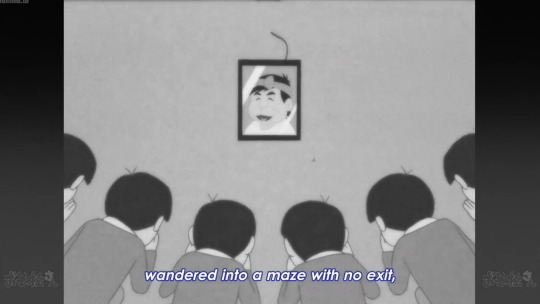
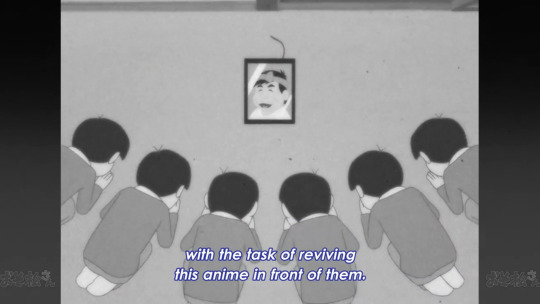
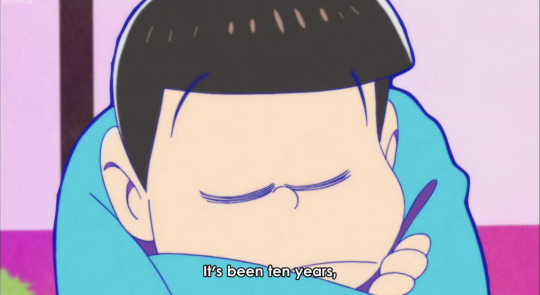
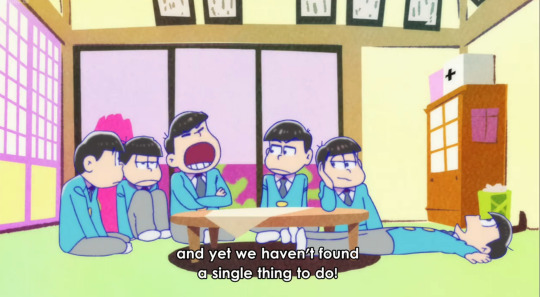
Right off the bat S1E1 makes it clear what to expect: Nothing. Not a damn thing. But, the show had already been cleared for this first season, so it has to be produced. This same episode’s preview is done by Osomatsu, which I’m just gonna quote instead screenshot because there’s too many.
“...we plan on properly starting the anime the next episode.”
“...you ended up with an extra minute, so you need me to do something to fill it?! Actually, is this anime going to be okay with episode one being like this? I’m getting worried about how the rest of this is going to be...”
“There, I used up a minute! [EPISODE ENDS]”
Episode one is not only batshit referential, but downright mocking the state of anime in 2015. Which, truthfully, I don’t have much to comment on in that regard, as I’m not an avid anime fan. However, it does this under the premise of being indecisive about what kind of anime they wanted the Osokun reboot to be.
They’ll do just about anything to stay popular and relevant considering that is, quite literally, all they have going for them as characters in the series and just being characters in general. They may be pieces of shit, but they’re likeable pieces of shit. The dynamics they’ve built upon to be entertaining is encouraged, and they’re basically just roleplaying different skits and fucking around.
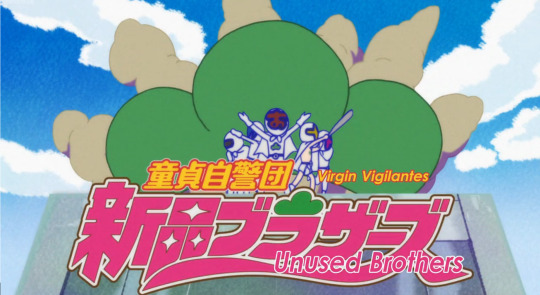

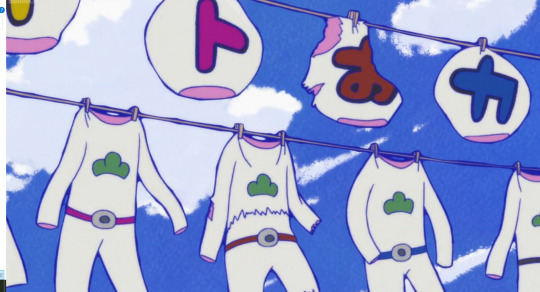
All the AUs! All the skits! They’re just playing! They’re just fuckin’ around!! They couldn’t come up with any interesting plot nor could they “graduate” from being anime protagonists and join the real world, so they just fuck around and make a gag anime!
Even if we follow both as the audience, the show makes a difference between the what’s them in their “normal life” (crazy begets crazy, no?) and what’s their “show.” But, really, that’s just one way to look at it, as they don’t really follow any rules as a show. I could say the Joshimatsus are separate characters from the sextuplets, and it’d be a “correct” interpretation. It doesn’t really matter - I’m choosing to examine it all as being the six of them just running around and playing, because being entertaining and having fun is all they know as characters. Besides, having it blended together beyond recognition reinforces how it prioritizes entertaining us, the audience, above logic. Storytelling doesn’t need to make absolute spatial-temporal sense for it to be enjoyable to fans.
In any case, that mentality really seems to be what pushes their character development negative, as they look to reinforce habits and rituals despite them being really detrimental for them in the long run. They know they’re popular characters as is, and with really everyone from staff to fans encouraging this behavior further, so they see no point in fixing what isn’t really broken.
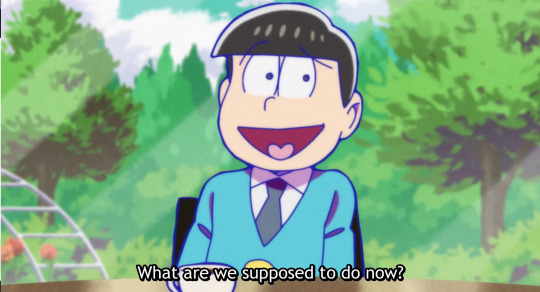

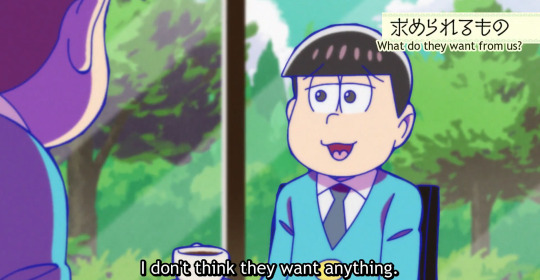
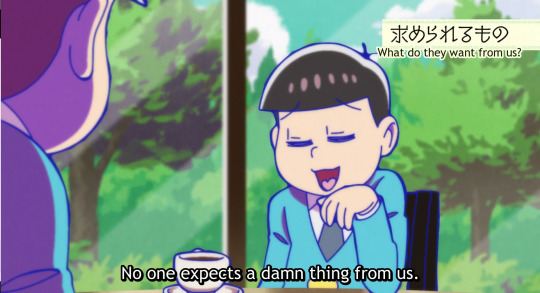
I found this 4 year old article from Manga.Tokyo discussing the Ososan phenomenon in Japan because while the craze died off pretty quickly in American anime circles (which deserves a whole other post), Japanese fans went fuckin’ nuts.
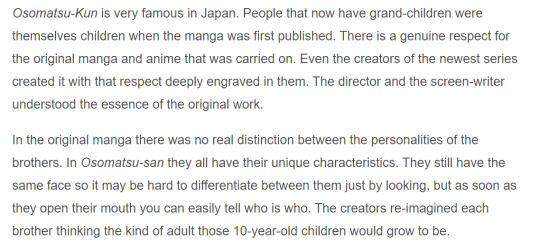
This portion caught my attention, as it makes sense that entitled and enabled asshole children would grow up to be entitled and enabled asshole adults. The article also goes on to compare them to idols (even beyond the F6 spoof) and that they are rooted in being comfort characters above all else.
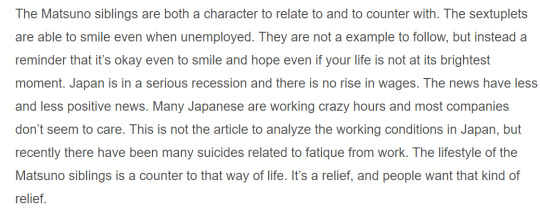
It’s worth a read, especially because Japanese fan response is what drives majority of the content post-S1, and, inevitably, ties into their character development.
They know that they’re Characters, particularly Protagonists. You know what happens to protagonists? Everything works out. Just about every single story created has stuff working out for protagonists. In fact, we have a whole genre made that separates stories with bad tragic endings from our Normal Stories. Ososan is a comedy, not a tragedy, so surely there’s gonna be some payoff somewhere along the road, especially as the seasons and other content are still being pumped out. To a self-aware, entitled, enabled protagonist, assuming everything is just gonna work out for you isn’t that far off from your narrative truth.
However, Ososan is a gag anime, and a lot of gag content (like 4koma mangas) is dropped for other projects before any emotional cathartic ending is provided for characters and fans alike. So, three seasons and a movie later, nothing has happened. It’s a great idol cash cow with a Family Guy filter, and the characters (and writers) don’t even bother to hide it anymore. And I know I’m being hypocritical concerning my definition of “canon material” but I think this portion from one of the drama cds “Choroplex” basically summarizes my point:
CHOROMATSU: Wait, don’t make this into a gag! You don’t even care about becoming employed, right?
KARAMATSU: There’s no way that could happen...
CHOROMATSU: What kind of future are you imagining? Is it nothing but this?
[HUGE PAUSE BEFORE THEY MOVE ONTO SOMETHING ELSE]
They’re parodies of themselves and are running out of ideas. Stagnation and decay is normal, if not unavoidable, at this point in time for them. They’re just 20 somethings who’ve hit a wall but they’re too scared and insecure to bring about permanent positive change. It’s easier for them to fall back into normal patterns and joke off the rest.
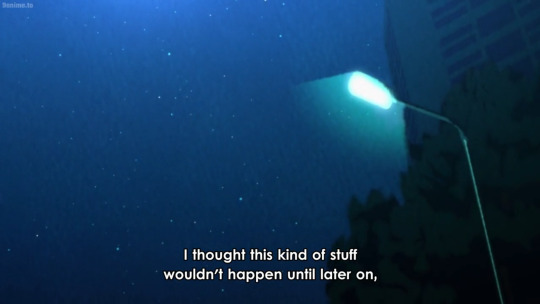
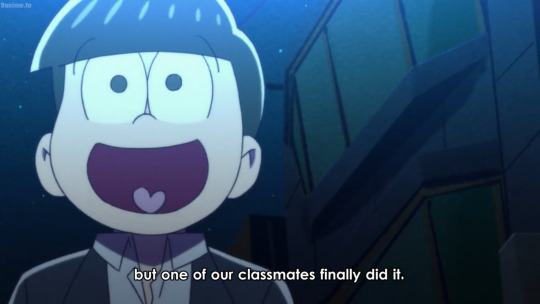
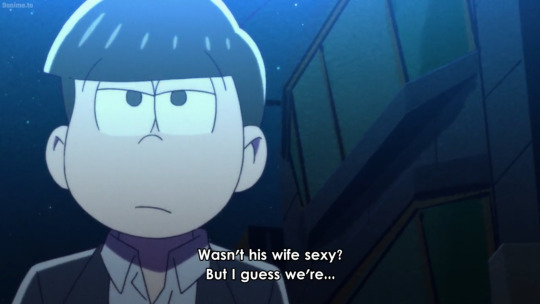
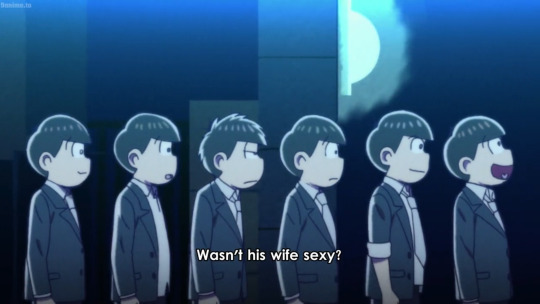
They have an antagonistic relationship with expectations. They can’t handle a single iota of expectations, or responsibilities. They’ve never needed to worry before, so why bother now? Once the biggest hits on the block, now they’re just guppies in the ocean, and there’s nothing they believe themselves to be able to accomplish to keep up with this big brave new world. This is epitomized in S3E15, where old man Osomatsu tells a bastardized version of the Tortoise and the Hare, blatantly projecting his feelings onto it. Again, too many screenshots so let me pull more quotes (bolding for my own reference):
“The place that the tortoise thought was the goal was not actually the goal. His journey down the road of life still continued on. The tortoise was quite tired, but he continued running anyway.”
“No one actually knew who was in front anymore. There are too many people above you.”
“After the tortoise found out how society worked, he thought, ‘So this is the difference in talent? No amount of hard work is going to fix this. All right. I’m done competing with others.’”
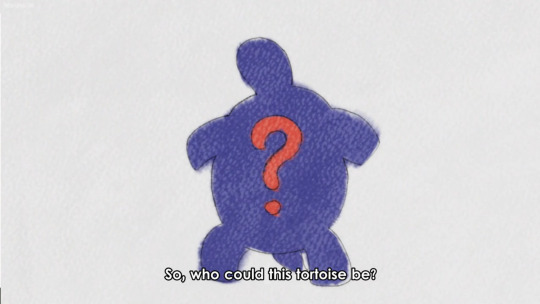
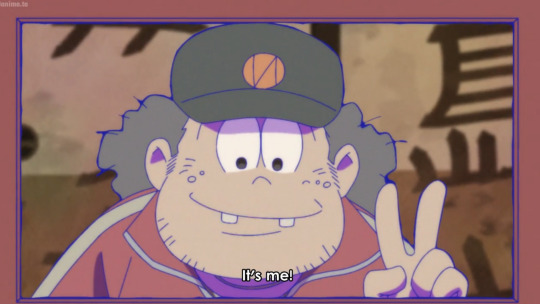
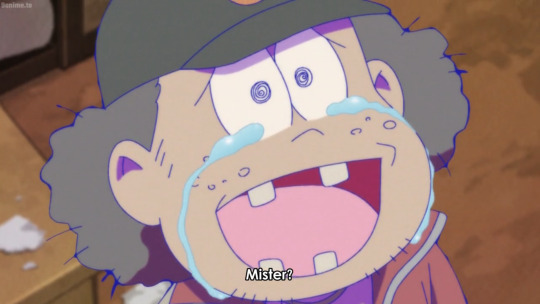
S3 has left more questionable endings than its counterparts. The last 2 skits I referenced don’t even a gag to them, and the marriage skit doesn’t play music for the entire second half of S3E5. There’s more involved too. I haven’t even brought up the rice ball twins becoming actual entertainers in their universe, or how they introduced this whole AI subplot only to reject it because All Six Of Them aren’t interested in expanding their little corner of the world. Here’s a transcript of the ending preview from S3E1:
“Hey, hey, Osomatsu here. I thought we were saved from being replaced, but I guess we get new characters next week. Man, we’re busy. New encounters, changing surroundings... We’re NEETs to begin with because all that is a pain. I guess a lot can happen after three seasons. [EPISODE ENDS]”
The sextuplets’ mindsets are extremely self-centered, which is also an environmental thing (the parents don’t even really care that they’re NEETs, for one) and an understanding of what they ought to be (epic successful protagonists). They also have a very black and white mentality, all or nothing. They’re extremely sheltered, and once they realized where they stood in society at large, they just gave up. To them the world is divided between winners and losers, and somehow, “inexplicably,” they found themselves to have fallen from grace. But they’re protagonists, that has to count for something! Everything’s gonna end up okay, right? Well... what this show has told them: No, not at all. They are consistently compared and warned of Iyami, and are perfectly aware of this fact, and have come to internalize it as a truth rather than a reversible self-fulfilling prophecy.
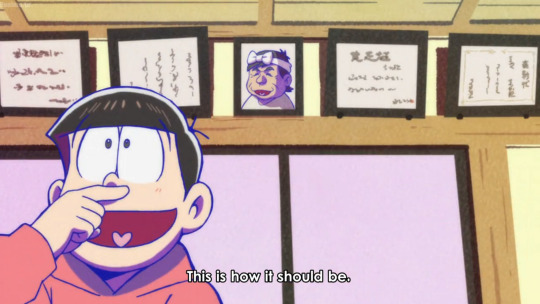
Too many screencaps, taken from the S3S5 marriage discussion:
JYUSHIMATSU: I wonder if we’re gonna get married someday, too.
CHOROMATSU: Well, I mean... probably? I’m not exactly sure, but...
TODOMATSU: What? You’re gonna get married, Choromatsu-niisan?
CHOROMATSU: Huh? Well, yeah... someday.
Surprise! They have commitment issues! The same group that couldn’t commit to a fucking plot! Though their personality issues have several factors involved, I can’t overlook the theater motifs abound. Life’s a stage, and they’re performing entirely unscripted and it shows.
Do I think all of this is 100% intentional on the writers’ part? No, probably not. There’s also an extra layer here regarding contemporary Japanese commentary that I’m not familiar with, so I just ended up focusing on the characters. I can’t be in the writers’ heads, but whatever decisions are being made by executives regarding censorship and “compliance” are reflected in these character changes that result in being significantly more bitter and defeatist.
In the all or nothing, winner-take-all mentality, the only way to save face at this point, in their minds, is to own up to it - act like it’s what they wanted all along. And, hey, it’s funny to watch, right?
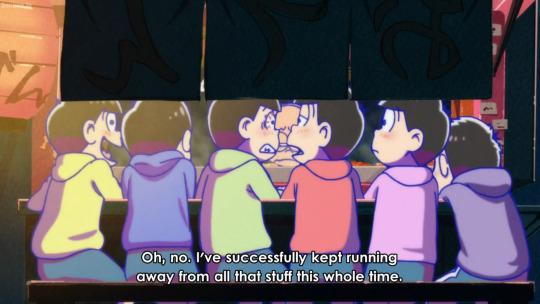
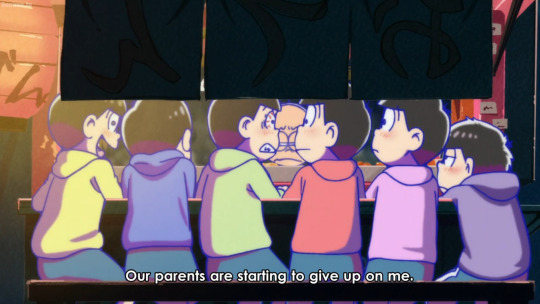
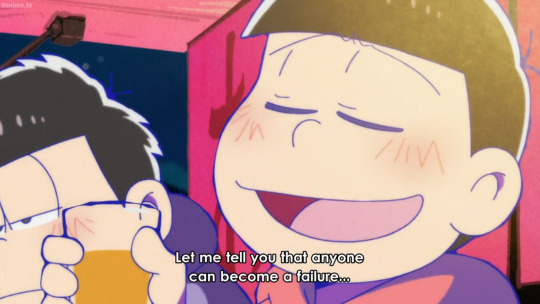
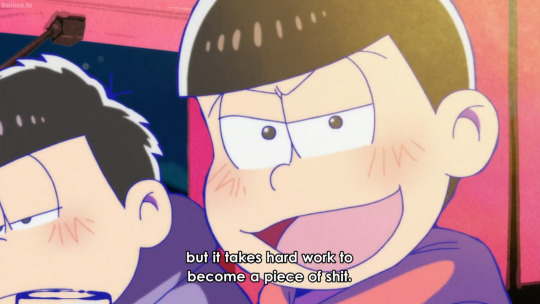
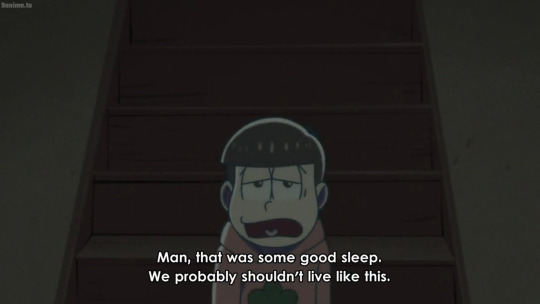
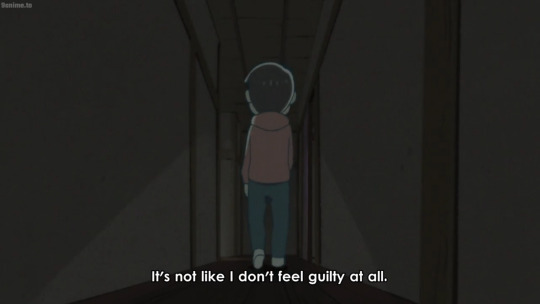
“Why is Osomatsu all my examples”, you might be asking. Well, he’s the damn blueprint for it all. The leader of the bunch, the first personality to grab your attention, has had all his issues projected and ricocheted in their echo chamber.
Ultimately, my point here is that you could think their “canon characterizations” (though canon means nothing in a show like this) as being intertwined with the nature of their self-aware existence. They’ve shown you all their tricks, the smoke and mirrors are getting boring, and they’re stalling long enough the story seems to be moving on without them - in spite of them. And when something genuinely threatens their way of life, they don’t know how to respond.
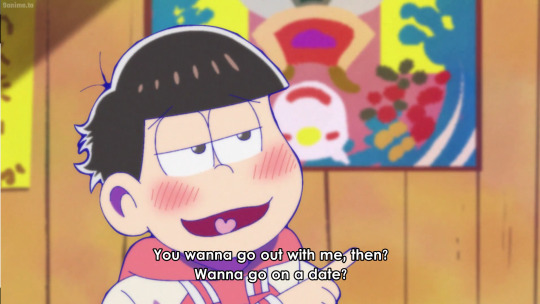
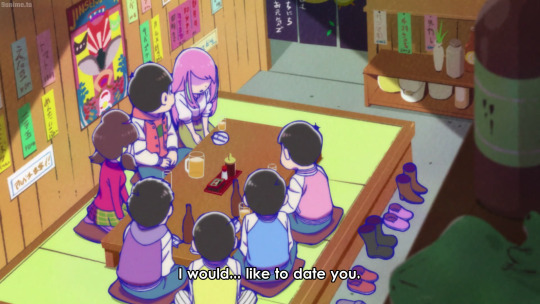
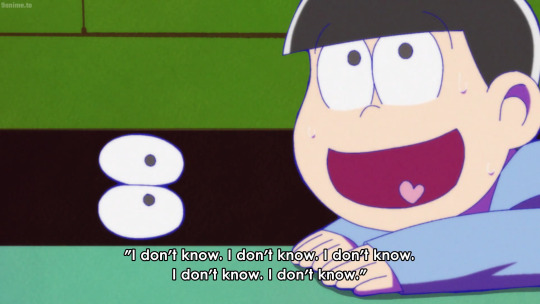
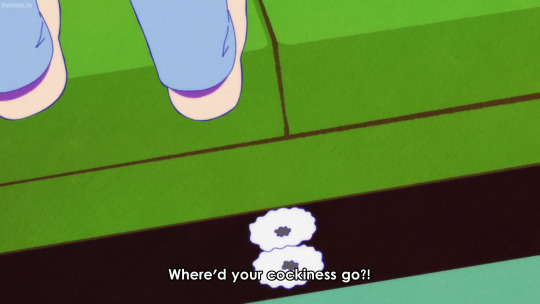
You can play it all straight, of course. Remove the meta jokes and all the same plot points can be hit, but, as a slapstick comedy, it’s able to easily add this additional layer in that I appreciate. I’ve said it in my last post and I’ll probably say it in more, but with comedy comes sincerity - the caveat of all the cartoon violence is that, on some level somewhere, this is how they really feel.
#osomatsu san#osomatsu#karamatsu#choromatsu#ichimatsu#jyushimatsu#todomatsu#osomatsu matsuno#karamatsu matsuno#choromatsu matsuno#ichimatsu matsuno#jyushimatsu matsuno#todomatsu matsuno#analysis#confession this was sparked by a convo i had w friends about s3e18#this is a bit truncated but i couldnt bring myself to make this longer#maybe ill make a pt2 or whatever idk
106 notes
·
View notes
Link
The left is in crisis across the West. It is out of power in most countries and out of touch with its historical working-class base. Class politics has given way to identity politics. And noble causes like anti-racism, anti-sexism and anti-discrimination have congealed into a stifling morass of political correctness and competitive victimhood.
Thankfully, there are some pockets on the left who recognise this predicament. I’m in New York to try to understand the thinking behind the ‘dirtbag left’. The phrase was coined by Amber A’Lee Frost, a writer, commentator and activist, to describe a loose constellation of American leftists who reject the civility, piety and PC that has come to characterise much of the left.
Frost is a co-host of the hugely successful Chapo Trap House, which offers a funny, irony-laden and often downright vulgar take on contemporary politics from the left. She also writes a column for the Baffler and is a trade unionist.
Newer on the scene is the acerbic and wickedly funny Anna Khachiyan, art critic turned cultural commentator, who co-hosts the podcast Red Scare. Red Scare saves its most biting criticism for ‘neoliberal’ feminism.
Among the most refreshing things about Frost and Khachiyan is that their politics are resolutely not woke. ‘You can tell people that I’m trans’, says Khachiyan, with characteristic irreverence, as Frost, Khachiyan and myself sit down to talk at Eastwood in the Lower East Side. ‘I’m not trans, but you can say that just for fun.’ Their reasons for rejecting wokeness are both pragmatic and political. ‘The majority of people are not woke’, explains Frost: ‘Why would we dismiss the majority of people as hopelessly reactionary?’
Not only that, for Frost, identitarian divisions based on gender, race and sexuality are ‘a distraction at best, an active detriment at worst’. ‘The biggest divide in American society is class and that’s it. I’m a class-first person’, she tells me. ‘You’re hearing in the election how much we need to elect a woman or we need to elect a woman of colour. But the most left-wing candidate is an old, white, heterosexual man [Bernie Sanders] and I want him to win… I’m a Bernie bro. I was a Bernie bro in 2016 and I am now.’
But would the first woman president not be a breakthrough for women? ‘They’re always talking about the “little girls” – how would little girls know that they can be president? It’s just so stupid. I was a little girl once, I’ve never felt limited by this stuff’, says Frost. She raises Margaret Thatcher: ‘You [Brits] had a girl boss – she showed those bro miners!’
Frost describes herself as a socialist. She says she came to socialism through feminist organising. But the current wave of media feminism turns her off. It is about ‘middle-class women trying to get spots in the boardroom’. ‘A lot of this stuff is “fight the power, put me on the throne”.’ Or it’s, ‘Men are rude to me and they explain things to me’, she jokes.
Of course, I suggest, there are many real struggles that women face, particularly working-class women – from low pay to childcare – so why do these issues barely get a look in? ‘They don’t care about working-class women’, Frost says of contemporary feminists. ‘Half the time they’re smearing them as reactionaries because they voted for Trump.’
‘I fundamentally think they are disgusted and horrified by working-class people’, says Khachiyan. ‘Real women don’t live up to the liberal-feminist pieties’, adds Frost. ‘And I think that’s very threatening for the uptight, white, overeducated, liberal women to be confronted with’, replies Khachiyan.
So why did so many people vote for Trump? ‘There are two categories of Trump voters worth discussing separately’, says Frost. ‘There was the wealthy, petit-bourgeois reactionary. But there were also working-class people who heard only one of the candidates talking about jobs.’
Trump has many faults, of course. ‘Fundamentally, he is a cruel, stupid man’, says Frost. But he has ‘a very good observational talent’. Liberals, suffering from Trump Derangement Syndrome, have been far too moralistic about the Trump vote, she argues: ‘Most people don’t believe that presidential candidates are telling the truth the entire time.’
Worse, the left’s response to Trump has been totally counterproductive: ‘Do you want to tell people how bad they are? Do you want them to repent because they’re bad racists? Or do you want them to pursue a left-wing project?’
‘Those people are ours to win’, says Frost. The populist moment is an opportunity, she says, but one which ‘I can totally see us pissing away’. ‘The self-identified left are very sceptical of the populist stuff. Look at their takes on the yellow vests: “They’re all fascists!” They’re probably just fucking French people – and who can tell the difference?’
Just as significant as Trump’s victory was Hillary Clinton’s loss, they tell me, in that it represented a rejection of an era of neoliberalism. ‘I’m from Indiana’, Frost tells me. ‘Bill signs NAFTA. That obliterated the towns where I’m from. People are extremely bitter about Bill Clinton for very good reasons. And she is married to that, literally and figuratively – she defends that legacy. How did we not see Trump coming?’
What’s more, Trump represented a repudiation of the entire establishment – Democrats and Republicans. ‘There is a severe crisis of legitimacy in our institutions’, says Frost: ‘The Republicans did not want Trump to win either… He was nobody’s first choice, except the American people’s, apparently.’
For Khachiyan, ‘You can say a lot of bad things about Donald Trump, but you can’t say the man is boring’.
‘Trump should be an artist, not a politician’, she adds. ‘He says, “I’ve never seen a thin person drinking Diet Coke”, and he loves Diet Coke, that’s his drink of choice. I don’t know if he’s self-aware or not.’
The problem with liberals, she says, is that ‘they can’t differentiate between their political critiques of Trump and their aesthetic critiques of him… He really brings to the fore all these inarticulable taboos. But as a politician, he’s not very exceptional.’ It is not so much Trump’s policies that anger the liberals, but his brashness, his demeanour. Frost adds, by way of example, that Obama also ‘threw tear gas at the border’.
Three years on from the 2016 presidential election, Democrats are still largely in denial or in despair about Trump’s victory. The now-discredited Russia-collusion narrative provided an excuse to avoid any soul-searching. ‘The whole Rachel Maddow and the NBC crowd have infected the minds of boomers with this dystopian narrative’, Khachiyan tells me. ‘Even my mom, who’s from Russia, buys the collusion narrative.’
‘The narrative isn’t itself so interesting’, she argues, but it shows ‘the willful failure of the Democratic Party. Again and again, they fall on their face. There’s some kind of Freudian, masochistic thing they have where they get off on publicly humiliating themselves.’
But while liberals may be electorally challenged, they still dominate mainstream culture. ‘“Liberal’ is the political denomination, but “nerd” is the cultural denomination’, says Khachiyan. ‘We’re living under the triumph of the nerds… If you had an American Psycho-esque novel today, there wouldn’t be this broad-shouldered besuited guy who looked like he walked out of the pages of an advertisement. It would be about a fin-tech soy boy. He’d be hunched over, clutching his tote-bag’, she says.
‘Bret Easton Ellis said there could never be the great Millennial novel – we’ll see. I haven’t read that Sally Rooney book that everybody’s writing about’, Khachiyan says, referring to the Irish author’s breakthrough novel, Normal People, which focuses on a millennial relationship. Frost adds that she read the book ‘with the intent of savaging it’, because ‘all the Guardian feminists like her’, but found ‘there was a lot of good shit in there’. ‘I think the women who like it don’t understand why they do… women today aren’t allowed to want a traditional relationship’, she says. Khachiyan adds: ‘Which is what most people since the dawn of time have wanted… There’s nothing reactionary about wanting a boyfriend!’
The conversation turns back to Bret Easton Ellis, a critic of what he calls snowflake culture, who is frequently accused of being a reactionary. ‘A lot of artists either don’t have any politics or their politics are retarded’, says Khachiyan. ‘His whole virtue as a writer is being a great stylist and a great narrator who retains plausible deniability. American Psycho has references to killing homeless black people, calling Asians “slant eyes”. And a lot of these woke SJW people sincerely think he’s a racist because he describes the condition… Artists are sometimes unassailable… The whole impulse to peg someone for what they are now is bizarre.’
Another recent favourite author among Guardian feminists is Kristen Roupenian, whose short story, ‘Cat Person’, went viral. The story is about a young woman who realises – slightly too late in the day – that the sexual encounter she is about to embark on is not what she wants. When the man finally realises he has been rejected, he lashes out. ‘Guardian feminists liked it because it “proved” men are trash because the man called her a whore at the end’, says Khachiyan. ‘Actually what it showed is that men can be sad and pathetic’, adds Frost.
Khachiyan tells me about an event she was at with Roupenian recently. (‘Hands down one of the most inarticulate, scatter-brained speakers – but the woman can write!’) Lena Dunham was meant to speak, she says, but didn’t show up because ‘she cooked up a fake illness’. ‘It was around the time she had her uterus removed’, she says. Frost adds that lots of American women are ‘voluntary removing their reproductive organs’. ‘Nobody is talking about this. It’s a middle-class, very elite phenomenon, where they’re like, “I have menstrual problems, I’m going to remove my womb”. Lena Dunham wrote a whole fucking essay about it.’
I asked how the seeming frigidity of the #MeToo moment, let alone the alleged epidemic of uterus removals, sits alongside modern feminism’s ‘sex positive’ celebration of polyamory, pansexuality and sex workers. ‘It’s because these people would rather negotiate sex than actually have it… They don’t want to take responsibility’, says Khachiyan. ‘That’s why nerds love this stuff’, says Frost. ‘It’s huge in Silicon Valley. They like games and rules. These are people who consider themselves leftists but probably don’t like anything about socialism except the gulags.’
Khachiyan says ‘a lot of these people are tyrannical narcissists’. ‘They are noncommittal, incapable of tolerating conflict or taking consequences. So they would rather have a system like polyamory where you kick that can down the road.’ Frost adds that many millennials ‘think they can eliminate jealousy… But sometimes you’re going to have bad sex, sometimes you’re going to be jealous. It’s not the end of the world.’
We move from jealousy to hate, and to the alleged epidemic of racism or even fascism often talked up by the left. Hate speech, we’re told, must be contained. Khachiyan takes a refreshingly liberal line: ‘You should be able to hate and hatred should be protected, as long as it doesn’t spill over into physical violence.’ ‘There’s this idea that we live in a white supremacist country when we fundamentally don’t’, says Khachiyan. She mentions antifa, the self-styled anti-fascist group that, since our conversation, has hit the headlines for beating up a right-leaning journalist in Portland. ‘Antifa have manufactured a threat to have some semblance of an identity’, she says. ‘All these people who say they are anti-fascist don’t know what it means to be persecuted.’
Frost and Khachiyan have a Marxist understanding of race. ‘We invented race to justify exploitation’, says Frost. ‘Splitting people on the basis of race was used to morally justify slavery… Racial discourse was created after hyper-exploitation.’ But ever since, argues Frost, ‘When we tried to not be racist, we ended up using the same framework’, which today also lives on in identitarian form. ‘All “race” is, is that some people don’t sunburn. That’s the entirety of racial difference.’
But how much can Marxism really illuminate today’s mad world? ‘Twitter call-out culture’, Frost concedes, ‘has no Marxist explanation. It makes no sense economically or even logically.’ Marx cannot account for a ‘social phenomenon where you rat out your closest friends’ and ‘describe them as reactionary’: ‘Why would you do that? Of course it will be bad for you.’
While there are plenty of woke types queuing up to ‘call out’ Frost, Khachiyan and their collaborators – even accusing them of being Nazis – let’s hope the dirtbag left can resist being ‘cancelled’ altogether. Voices like these, challenging woke orthodoxy and standing up for traditional left values, are needed now more than ever. Here’s to the dirtbags.
Fraser Myers is a staff writer at spiked and host of the spiked podcast. Follow him on Twitter: @FraserMyers.
#marxism#dirtbag left#chapo trap house#interview#Amber A’Lee Frost#Anna Khachiyan#cancel culture#callout culture#sjw#liberalism#neoliberalism#silicon valley
9 notes
·
View notes